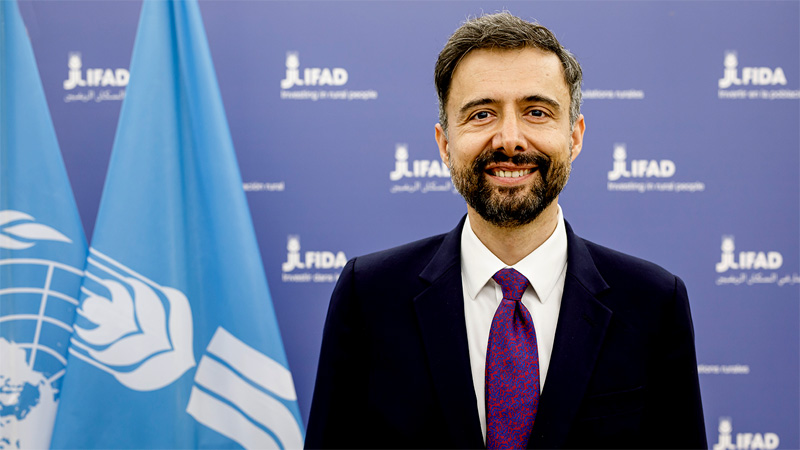Lemohang Rakotsoane
Farmers say inadequate agricultural technologies, stringent conditions towards access to finance, and unavailability of inputs locally undermine their efforts towards food security.
Due to climate change, they say farming without proper climate change-resilient technologies is a gamble.
Mahasela Nkoko, a cash crop farmer, was previously producing potatoes in the valley of Semonkong in the rural of Maseru.
However, due to heavy rainfalls in the previous years that resulted in potatoes being washed away, he has now resorted to producing cabbage.
“The problem we have is that climate change is ahead of us. We feel its severe impacts because we are still farming the traditional way which is no longer working,†Nkoko said.
He explained that South Africa also experiences climate change but because its farmers are better equipped with smart agricultural technologies, agricultural inputs, weather forecasts, and funds, they are able to produce enough to export to other countries such as Lesotho.
“We do not have the financial muscle to buy agricultural technologies on our own. Each year it is a scramble for agricultural inputs. There are no skills to fix available agricultural equipment and no insurance for agricultural products such as crops,†he said.
“It is an annual struggle that gets tougher every year,†Nkoko added.
In an interview with this publication, the Vice-Chairman of the Lesotho National Farmers Union (LENAFU), Daniel Chakela, said farming technologies are expensive and difficult for farmers to access.
“Other nations have availed funds to assist farmers with protective farming but public servants have come up with stringent conditions to ensure that real farmers do not access these opportunities,†Chakela said.
Grant processes for agricultural-related activities, he said, tend to favour those with money and no significant farming experience. As a result, real farmers are excluded and vulnerable to climate change impacts.
“We have asked the government to simplify the process to access agricultural grants. To make them accessible to real farmers not to the highest bidder,†Chakela said.
He added: “There is no reason for farmers to be asked to have 40 percent of the total amount they are asking for as collateral. If a farmer can prove that they have land, skills, and notable farming experience, they must be given funds.
What they are currently asking for from us is hefty amounts we do not have. If you want to buy, for example, a tunnel that will enable control of temperatures and ensure that you produce all year round, you need about a million Maluti. This means you need to have at least M400,000.00 which is not what many farmers can afford.â€
He indicated that their plea as farmers is for government to come up with holistic agricultural interventions to enable farmers to produce to the best of their abilities.
“In November last year, we sat down with the government to inform them about the direction that we think agriculture must take in the country. Hopefully, we will soon see some of those things we mentioned being implemented,†Chakela said.
The Integrated Food Security Phase Classification (IPC) Acute Food Insecurity analysis published by the World Food Programme (WFP) Lesotho in August last year stipulated that as a result of climate change, heavy rainfalls had resulted in poor food production leaving thousands of Basotho food insecure.
“From October 2022 to March 2023, an estimated 320,000 people representing 22 percent of the population in rural areas of Lesotho are projected to be in IPC Phase 3 (Crisis). Eight of the analyzed districts are projected to be in IPC Phase 3 (Crisis)†the report stated.
It indicated that at a country level, and with regard to the weather condition itself, seasonal rainfall came with no delay.
However, it added, throughout the rainy season most areas experienced excessive amounts of rain, which destroyed some crops and caused waterlogging in most parts of the country.
According to the meteorologist, ‘Marealeboha Boutu, like many countries, Lesotho is also experiencing climate change which has resulted in heavy rainfalls, increased temperatures, hailstorms, and heavy snowfalls.
Boutu explained that, unfortunately, climate change cannot be stopped but there are ways to minimize its impact, especially on agricultural activities.
“We encourage farmers to adopt climate change-resilient farming techniques like the usage of protective and smart agricultural technologies such as greenhouses and tunnels,†she said.
She also encouraged farmers to mulch their plots saying this creates a sponge-like environment that is not only able to assist in conserving soil moisture and controlling erosion loss but also suppresses weed growth, removes the residual effects of pesticides and fertilizers, and absorbs water for future use.
Farmers should also “produce drought-resilient crops like wheat,†she said.
Boutu further indicated that the country takes climate change seriously.
This, she said, is evident through the initiatives taken by the country such as the development of the climate change policy and the development of the climate Change Smart Agriculture Investment Plan.
The government’s seriousness is also reflected in projects like THE Wool and Mohair Promotion Project (WAMPP) and the Smart Agriculture Development Project (SADP) aimed at assisting farmers to overcome climate change-induced agricultural challenges.
“However, we do need to draw from lessons learned from these initiatives to intensify our efforts towards minimizing climate change impacts,†Boutu said.
Next month during the 5th United Nations Conference on the Least Developed Countries (LDC5) in Doha, world leaders will gather with the private sector, civil society, parliamentarians, and young people to advance new ideas, raise new pledges of support, and spur delivery on agreed commitments, through the Doha Programme of Action (DPoA).
“The DPoA is a complete package to address the pre-existing challenges of the LDCs, their vulnerabilities, and put them back on track to achieve the 2030 Agenda,†said Rabab Fatima, UN High Representative for the Least Developed Countries, Landlocked Developing Countries and Small Island Developing States, who will act as Secretary-General to the LDC5 conference.
Over five days of the LDC5 Conference in Doha, from March 5 to 9, world leaders will gather with the private sector, civil society, parliamentarians, and young people to advance new ideas, raise new pledges of support, and spur delivery on agreed commitments, through the Doha Programme of Action.
At the Conference, it is expected that specific initiatives and concrete deliverables will be announced that will address LDC-specific challenges.

Your Trusted Source for News and Insights in Lesotho!
At Newsday Media, we are passionate about delivering accurate, timely, and engaging news and multimedia content to our diverse audience. Founded with the vision of revolutionizing the media landscape in Lesotho, we have grown into a leading hybrid media company that blends traditional journalism with innovative digital platforms.












